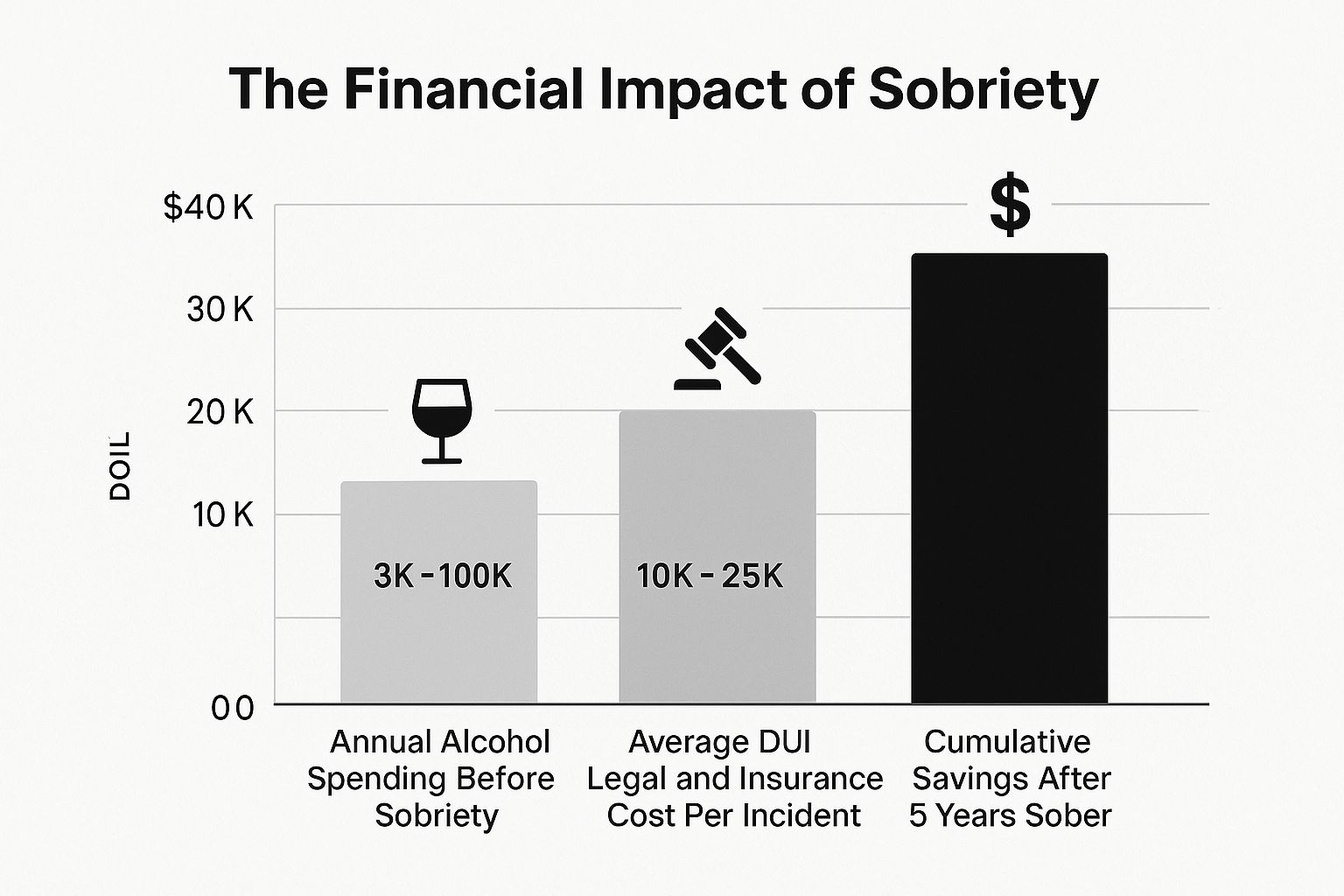
8 Life-Changing Benefits of Sobriety in 2025
Embarking on a journey to sobriety is often framed as an act of giving something up. In reality, it is a profound act of gaining. Choosing a substance-free life initiates a cascade of positive changes that ripple through every facet of your existence, from your physical health to your financial well-being. The path is challenging, but the rewards are immeasurable and life-altering.
This comprehensive guide moves beyond the surface-level advantages to explore the eight most significant benefits of sobriety. We will detail the deep, transformative power that comes from reclaiming a clear mind and a healthy body. You will discover tangible gains in your bank account and physical vitality, alongside the powerful shifts in your personal relationships and self-perception. These benefits are the building blocks for a more authentic, stable, and fulfilling life.
We’ll provide specific, actionable insights to help you not only understand these changes but fully embrace them as they unfold. Each point is designed to offer a clear roadmap, illustrating how sobriety unlocks your true potential. By understanding what awaits, you can build a stronger foundation for lasting recovery and personal growth. Let’s explore what you stand to gain.
1. Improved Physical Health
One of the most immediate and profound benefits of sobriety is the remarkable recovery of your physical health. When you stop consuming alcohol or drugs, you give your body a crucial opportunity to heal from their toxic effects. Organs that have been working overtime to process these substances can finally begin to repair and restore their normal function, leading to a cascade of positive changes.
This healing process starts almost immediately. The liver, heart, and immune system, which are often heavily impacted, begin to recover. Inflammation throughout the body decreases, blood pressure starts to normalize, and your risk for developing chronic diseases like cancer, heart disease, and liver cirrhosis drops significantly.

Tangible Health Improvements
The physical recovery from substance use is not just an abstract concept; it can be measured and observed through concrete medical markers. Many people in recovery are amazed at how quickly their bodies respond to the absence of harmful substances.
- Liver Regeneration: Liver enzymes, often elevated from substance use, can return to a normal range within 3-6 months. Fatty liver disease, a common precursor to more severe liver damage, can be visibly reduced on medical scans.
- Cardiovascular Health: Blood pressure can decrease by 10-15 points within the first month of sobriety, reducing the strain on your heart and arteries.
- Restorative Sleep: While sleep may be disrupted initially, your natural sleep architecture begins to normalize after 2-3 months. This leads to more restorative, deeper sleep, which is vital for both physical and mental healing.
Actionable Steps to Support Your Recovery
You can actively support your body’s healing journey as you embrace sobriety. Taking a proactive role empowers you and can accelerate the positive changes.
Key Insight: Your body has an incredible capacity for healing. The best thing you can do is remove the obstacle (alcohol or drugs) and provide the right support for its natural recovery processes.
Here are practical tips to implement:
- Establish a Baseline: Get a comprehensive health check-up early in your recovery. This provides a clear picture of your starting point and allows you and your doctor to track progress.
- Fuel Your Body: Focus on a nutrient-rich diet and stay well-hydrated. Proper nutrition provides the building blocks your organs need to repair themselves.
- Move Gently: Begin with light exercise, like walking or stretching, and gradually increase the intensity as your energy and stamina improve. Physical activity boosts circulation and supports overall well-being.
- Be Patient: Remember that healing is not linear. Different organs recover at different paces, so be patient and celebrate small victories along the way.
2. Enhanced Mental Clarity and Cognitive Function
One of the most transformative benefits of sobriety is the restoration of your mental acuity and cognitive function. When you stop using substances, you give your brain a chance to heal, reversing the “brain fog” that often accompanies addiction. The brain’s inherent neuroplasticity allows it to rebuild neural pathways, leading to sharper thinking, better focus, and improved mental processing speed.
This cognitive recovery significantly impacts all areas of life. Decision-making becomes clearer, memory recall improves, and your ability to concentrate on complex tasks is restored. This mental sharpening is not just a feeling; it is a real, measurable improvement in how your brain processes information.

Tangible Cognitive Improvements
The cognitive gains from sobriety can be observed through improved performance in daily life and on standardized tests. Many people find their professional and personal effectiveness skyrockets once their mind is clear.
- Improved Work Productivity: Professionals often report a 30-40% improvement in work productivity within six months of sobriety as focus and problem-solving skills return.
- Academic Success: Students who embrace sobriety frequently see a significant increase in their grade point averages, as their ability to study and retain information is enhanced.
- Better Decision-Making: Entrepreneurs and leaders find they make more strategic and successful business decisions with a clear, sober mind. Sobriety also plays a crucial role in strengthening executive function, which encompasses vital skills like planning, problem-solving, and self-control. To further enhance these abilities, you can learn more about how to improve executive function.
Actionable Steps to Support Your Recovery
You can actively support your brain’s healing process and accelerate your cognitive recovery. Engaging your mind in new ways helps forge stronger neural connections and enhances mental clarity.
Key Insight: Your brain is designed to heal and adapt. By removing toxic substances and actively engaging in cognitive exercises, you can significantly speed up the restoration of your mental sharpness.
Here are practical tips to implement:
- Engage in Brain Training: Actively challenge your mind with puzzles, reading, learning a new skill, or playing strategic games.
- Practice Mindfulness: Incorporate meditation and mindfulness exercises into your routine to improve focus, reduce mental chatter, and enhance concentration.
- Prioritize Sleep: Stick to a consistent sleep schedule. Deep, restorative sleep is when the brain consolidates memories and clears out metabolic waste.
- Nourish Your Brain: Consume brain-healthy nutrients, especially omega-3 fatty acids found in fish, nuts, and seeds, to support cognitive repair.
3. Improved Mental Health and Emotional Stability
One of the most transformative benefits of sobriety is the profound improvement in mental health and emotional stability. When you stop using substances that artificially alter brain chemistry, you give your mind the chance to recalibrate. Neurotransmitters like dopamine and serotonin, which govern mood and pleasure, gradually return to a natural state of balance.
This rebalancing process leads to a significant reduction in common mental health challenges. Issues like chronic anxiety, deep-seated depression, and unpredictable mood swings often lessen as the brain heals. You begin to experience your emotions authentically, learning to process them without the crutch of a substance, which builds genuine emotional resilience over time.
Tangible Mental and Emotional Gains
The positive changes in your mental landscape are not just feelings; they are measurable and often life-altering. Many people in recovery are surprised by the clarity and peace they find as their brain chemistry normalizes.
- Anxiety and Depression Reduction: Studies and anecdotal reports show a dramatic decrease in symptoms. Some individuals see up to a 70% reduction in anxiety after a year of sustained sobriety.
- Emotional Regulation: Instead of numbing or amplifying feelings with substances, you develop the capacity to sit with and understand your emotions, leading to more thoughtful responses rather than knee-jerk reactions.
- Genuine Happiness: Many report experiencing true, unadulterated joy for the first time in years, a feeling that was previously inaccessible or masked by substance use.
Actionable Steps to Support Your Mental Well-being
You can actively foster your mental and emotional recovery alongside your sobriety. Taking deliberate steps to build healthy coping mechanisms is essential for long-term stability and is a key part of the healing journey.
Key Insight: Sobriety doesn’t just remove a negative coping mechanism; it opens the door to building positive, sustainable ones that support lasting mental health.
Here are practical tips to implement:
- Engage in Therapy: Work with a mental health professional to explore underlying issues and develop healthy coping strategies. Therapies like Cognitive Behavioral Therapy (CBT) are highly effective.
- Practice Mindfulness: Incorporate techniques like deep breathing, meditation, or grounding exercises into your daily routine to manage stress and stay present.
- Journal Your Feelings: Writing is a powerful tool for processing emotions constructively. It helps you identify patterns, triggers, and progress without judgment.
- Build a Support System: Join a support group or connect with trusted friends and family. Sharing your experiences with others who understand can combat isolation and provide crucial encouragement. As you embrace sobriety, cultivating a strong mental foundation is key; you can further support your well-being by exploring evidence-based mental health self-care tips.
4. Financial Stability and Economic Benefits
One of the most tangible and empowering benefits of sobriety is the profound improvement in your financial health. Active addiction is incredibly expensive, creating a constant drain on resources that extends far beyond the direct cost of substances. When you embrace sobriety, you stop this financial leak and open the door to building a secure and prosperous future.
The economic recovery begins by eliminating the staggering costs associated with substance use. This includes not just the daily or weekly expense of alcohol or drugs, but also related costs like legal fees from a DUI, lost wages from poor performance, and medical bills. This newfound capital can be redirected from funding a destructive habit to building a life of stability and opportunity.
The following bar chart visualizes just a few of the major financial drains associated with substance use and the potential for savings in recovery.

As the data clearly illustrates, the cumulative financial impact is substantial, showing how sobriety allows you to reclaim tens of thousands of dollars for your future.
Tangible Financial Improvements
The economic turnaround in sobriety is not a distant dream; it is a measurable reality. The money you save adds up quickly, creating opportunities that were previously unimaginable.
- Elimination of Direct Costs: An individual who spends $15 per day on alcohol saves $5,475 in the first year alone. For those with more expensive substance habits, annual savings can easily climb into the tens of thousands.
- Reduced Ancillary Expenses: The average cost of a single DUI can range from $10,000 to $25,000 when accounting for fines, legal representation, and increased insurance premiums. Sobriety removes this significant financial risk.
- Increased Earning Potential: With improved focus, reliability, and cognitive function, individuals in recovery often experience career advancement. Many report receiving promotions or finding better-paying jobs within 1-2 years of sustained sobriety.
Actionable Steps to Support Your Financial Recovery
You can maximize the economic benefits of sobriety by taking deliberate and strategic steps to manage your finances. This proactive approach helps you build wealth and achieve long-term stability.
Key Insight: Your finances are a powerful tool for rebuilding your life. By redirecting the money once spent on substances, you are directly investing in your own well-being, goals, and future.
Here are practical tips to implement:
- Track Your Sobriety Savings: Open a dedicated savings account and automatically transfer the amount you used to spend on substances each week. This makes your progress visible and motivating.
- Create a Recovery Budget: Develop a new budget that allocates your reclaimed funds toward positive goals, such as paying down debt, building an emergency fund, or saving for a down payment.
- Invest in Your Career: Use a portion of your savings for professional development, like taking a course, earning a certification, or attending industry networking events to boost your earning potential.
- Set Inspiring Financial Goals: Define clear, exciting goals for your money, such as a dream vacation, funding a child’s education, or starting a business. This provides a powerful incentive to stay on track.
5. Stronger and Healthier Relationships
One of the most rewarding benefits of sobriety is the chance to rebuild and nurture authentic, meaningful relationships. Substance use often creates a chasm between you and your loved ones, built on broken promises, emotional distance, and mistrust. When you embrace sobriety, you remove the substance that was at the center of your life and create space for people to return to that role.
The clarity and emotional presence you regain allow for genuine connection. You are no longer interacting through a fog but as your true self, capable of giving and receiving love, support, and understanding. This new foundation allows you to repair damaged bonds and build new, healthy connections that support your recovery journey.

Tangible Relationship Improvements
The transformation in your relationships isn’t just a feeling; it manifests in concrete, life-altering ways. As you consistently show up as a reliable and present person, trust begins to heal, and communication deepens, leading to stronger bonds with family, friends, and partners.
- Rebuilding Family Trust: Parents who achieve sustained sobriety often regain custody of their children. Adult children may reconnect with sober parents after years of painful estrangement, healing generational wounds.
- Strengthening Partnerships: Marriages and romantic partnerships strained by addiction can find new ground for healing and growth. With both partners committed to recovery, intimacy and mutual respect can flourish again.
- Forming Healthy Friendships: Recovery communities provide a space to build new friendships with people who understand your journey. These connections are based on mutual support and shared values, not substance use.
Actionable Steps to Support Your Relationships
Actively working on your relationships is a crucial part of recovery. Being intentional about how you engage with others can accelerate healing and create a powerful support system for your long-term sobriety.
Key Insight: Sobriety gives you the tools to be the person you want to be for others. Your presence, honesty, and consistency are the most powerful gifts you can offer in rebuilding trust.
Here are practical tips to implement:
- Practice Active Listening: Engage in conversations without the influence of substances. Truly hear what your loved ones are saying, which fosters deeper understanding and connection.
- Make Amends When Ready: If you are following a 12-step program, the process of making amends can be a powerful tool for healing. It’s about taking responsibility and showing a commitment to change.
- Communicate Your Boundaries: Sobriety requires protecting your well-being. Clearly and kindly communicate your needs and boundaries to others, which is a hallmark of a healthy relationship.
- Seek Professional Guidance: Family or couples therapy can provide a safe and structured environment to address deep-seated issues and learn healthier communication patterns.
6. Increased Productivity and Goal Achievement
One of the most empowering benefits of sobriety is the dramatic surge in personal productivity and the newfound ability to achieve long-held goals. Substance use consumes an enormous amount of time and mental energy, from acquiring and using substances to recovering from their effects. Sobriety reclaims these lost hours and pairs them with improved cognitive function, creating a powerful combination for success.
This newfound capacity allows you to pursue ambitions that may have seemed impossible before. The clarity, focus, and stable energy levels that sobriety provides are the essential ingredients for building momentum in your career, education, personal projects, and fitness. You are no longer just surviving; you are actively building a life you value.
Tangible Productivity Gains
The shift from a life revolving around substance use to one driven by purpose is marked by concrete, measurable achievements. Individuals in recovery often accomplish more in their first year of sobriety than they did in the previous decade.
- Career and Education: Many people earn promotions, switch to more fulfilling careers, or complete degrees they had previously abandoned. The ability to show up consistently and perform at a high level is a game-changer.
- Fitness and Hobbies: Goals like running a marathon, learning a new language, or starting a creative project become attainable. Consistent effort, once difficult to maintain, is now a reliable part of daily life.
- Personal Finance: With clear-headed decision-making and the money saved from not purchasing substances, individuals can pay off debt, start saving, and build financial security.
Actionable Steps to Boost Your Productivity
You can harness this new potential by being intentional with your time and energy. Structuring your days and setting clear objectives will help you make the most of your recovery.
Key Insight: Sobriety doesn’t just give you back time; it gives you back the mental clarity and energy to use that time effectively, turning dormant dreams into tangible realities.
Here are practical tips to implement:
- Set SMART Goals: Define what you want to achieve with goals that are Specific, Measurable, Achievable, Relevant, and Time-bound. This creates a clear roadmap.
- Structure Your Time: Use a planner or calendar to schedule your days. Block out time for recovery activities, work, exercise, and personal projects to build powerful routines.
- Start Small: Focus on small, manageable wins to build momentum. Completing a short workout or organizing a single drawer can create a positive feedback loop that fuels larger achievements.
- Track Your Progress: Keep a journal or use an app to log your accomplishments, no matter how minor they seem. Seeing how far you’ve come is a powerful motivator.
7. Enhanced Self-Esteem and Personal Identity
Sobriety creates the space for profound personal growth, allowing you to build an authentic sense of self-worth based on real accomplishments and integrity. When substances are no longer distorting your perceptions, you can begin to discover, or perhaps rediscover, your true identity, values, and purpose, which is one of the most rewarding benefits of sobriety.
This journey of self-discovery moves you away from the artificial confidence or shame often tied to substance use. Instead, you build a stable foundation of self-respect by living in alignment with your principles. This newfound clarity and self-awareness are essential for creating a meaningful life that feels genuinely your own.
Tangible Growth in Self-Worth
The development of a strong personal identity isn’t just a feeling; it manifests in observable changes and milestones. As you navigate recovery, you start to see evidence of a more authentic and confident version of yourself emerging.
- Discovering New Passions: Many find artistic, athletic, or intellectual talents that were suppressed by addiction. This could mean picking up a paintbrush, running a marathon, or going back to school.
- Aligning Career with Values: A clearer sense of self often leads to career changes that are more fulfilling and aligned with personal values, rather than just chasing a paycheck.
- Finding Purpose in Service: Some, like advocate Demi Lovato, find immense purpose in helping others in recovery, turning their personal struggles into a source of strength and connection.
- Feeling “Yourself”: Perhaps the most common report is simply feeling “like myself” for the first time in years, a testament to reconnecting with one’s core identity.
Actionable Steps to Build Your Identity
You can actively cultivate self-esteem and explore your identity as you move forward in your sobriety. Taking intentional steps empowers you to define who you are on your own terms.
Key Insight: True self-esteem isn’t about being perfect; it’s about being authentic. Sobriety gives you the clarity to live honestly and build a life that reflects your true values.
Here are practical tips to implement:
- Explore New Hobbies: Sign up for a class or join a group dedicated to an activity you’ve always been curious about. This is a low-pressure way to discover what you genuinely enjoy.
- Set and Achieve Small Goals: Build genuine confidence by setting small, achievable goals, like reading a chapter of a book each day or completing a 5k walk. Acknowledge and celebrate each success.
- Practice Self-Compassion: Challenge your inner critic with positive self-talk. Treat yourself with the same kindness and understanding you would offer a friend.
- Engage in Reflective Journaling: Use a journal to explore your values, dreams, and what truly matters to you. This practice helps clarify your personal mission and identity.
8. Reduced Legal Problems and Increased Personal Safety
One of the most liberating benefits of sobriety is the drastic reduction in legal troubles and a significant boost in personal safety. Substance use often clouds judgment, leading to risky behaviors that can result in arrests, DUIs, accidents, and other serious legal consequences. By removing drugs and alcohol, you regain clarity and control, steering your life away from dangerous situations and the courtroom.
This newfound stability brings immense peace of mind. The constant worry about potential legal entanglements, probation violations, or financial penalties from fines and legal fees dissipates. You can begin to rebuild your life on a foundation of responsible choices, opening doors to opportunities that were previously closed due to a criminal record or ongoing legal battles.
Tangible Legal and Safety Improvements
The positive impact on your legal standing and personal safety is immediate and measurable. As you embrace sobriety, you systematically eliminate the behaviors that put you in harm’s way, and the results are life-changing.
- Financial Freedom: Avoiding a single DUI can save you over $10,000 in fines, legal fees, and increased insurance premiums, not to mention preventing license suspension and potential jail time.
- Restored Rights: Maintaining sobriety is often a key requirement for regaining custody of children, having probation terms successfully completed, or having a suspended license reinstated.
- Career Advancement: A clean legal record makes it possible to obtain professional licenses, pass background checks for employment, and pursue career paths without restriction.
- Personal Security: Improved judgment leads to a sharp decline in accidents, physical altercations, and being in vulnerable situations, drastically improving your overall personal safety.
Actionable Steps to Secure Your Future
You can take proactive steps to resolve past issues and protect your future as you move forward in your recovery. Being organized and intentional is key to navigating any existing legal complexities.
Key Insight: Sobriety doesn’t just prevent future legal problems; it provides you with the clarity and stability needed to actively resolve and move past any existing ones.
Here are practical tips to implement:
- Consult a Professional: If you have outstanding legal issues, work with an attorney to understand your options and create a clear plan for resolution.
- Document Everything: Meticulously maintain records of your sobriety, such as attendance at support meetings or completion of treatment programs, as this documentation can be invaluable for court purposes.
- Fulfill Obligations: Prioritize completing all court-ordered requirements, like community service or classes, to demonstrate your commitment and responsibility.
- Change Your Environment: Consciously avoid people, places, and situations that you associate with past risky behaviors or legal troubles to protect your progress.
Benefits of Sobriety: 8-Point Comparison Guide
| Aspect | Improved Physical Health ⭐📊 | Enhanced Mental Clarity and Cognitive Function ⭐📊 | Improved Mental Health and Emotional Stability ⭐📊 | Financial Stability and Economic Benefits ⭐📊⚡ | Stronger and Healthier Relationships ⭐📊💡 | Increased Productivity and Goal Achievement ⭐⚡📊 | Enhanced Self-Esteem and Personal Identity ⭐💡📊 | Reduced Legal Problems and Increased Personal Safety ⭐📊 |
|---|---|---|---|---|---|---|---|---|
| Implementation Complexity 🔄 | Moderate; requires health monitoring and lifestyle changes | Moderate; needs cognitive support and patience | Moderate to high; may require therapy and emotional work | Moderate; involves budgeting and financial planning | Moderate; requires communication effort and therapy | Moderate; needs schedule and habit formation | Moderate; involves deep self-reflection and therapy | Moderate; involves legal support and behavioral changes |
| Resource Requirements ⚡ | Healthcare access, nutrition, exercise | Mental exercises, mindfulness, nutrition | Professional mental health support, support groups | Financial counseling, budgeting tools | Therapy, support groups, time investment | Productivity tools, coaching, time management tools | Therapy, personal development resources | Legal assistance, court programs, documentation |
| Expected Outcomes ⭐📊 | Improved organ function, reduced disease risk | Sharper cognition, better memory, focus, decision making | Mood stabilization, reduced anxiety and depression | Increased savings, reduced expenses, better credit | Rebuilt trust, improved communication, healthier bonds | Increased work performance, skill mastery, goal completion | Authentic confidence, value alignment, personal growth | Fewer legal issues, improved safety, employment opportunities |
| Ideal Use Cases 💡 | Individuals recovering from physical substance damage | Those needing cognitive restoration post-addiction | People with co-occurring mental health symptoms | Individuals seeking financial recovery post-addiction | Those repairing family and social relationships | Individuals aiming to leverage sobriety for achievement | People rebuilding identity and self-worth | Those with legal history or at risk of legal issues |
| Key Advantages ⭐ | Rapid health improvements, longer lifespan | Enhanced productivity and mental stamina | Genuine emotional wellbeing and resilience | Immediate and long-term financial benefits | Deeper, authentic, and stable relationships | Significant time reclaimed and goal focus | Lasting self-respect and meaningful life direction | Peace of mind, legal freedom, safety, and social reintegration |
Your Next Chapter: Embracing the Journey with Confidence
Embarking on the path to sobriety is far more than simply abstaining from alcohol; it is an act of profound self-reclamation. As we’ve explored, the journey unlocks a cascade of positive transformations that ripple through every aspect of your existence. This isn’t just about avoiding a negative but actively choosing a positive, vibrant, and more fulfilling way of life.
The benefits of sobriety are not isolated perks but interconnected pillars supporting a new foundation. Reclaiming your physical health provides the energy to pursue your goals. Enhanced mental clarity allows you to navigate challenges with greater focus and resilience. Emotional stability empowers you to rebuild relationships on a bedrock of trust and presence, while financial freedom opens doors to opportunities that once seemed out of reach. Each step forward reinforces the next, creating a powerful cycle of growth and empowerment.
From Knowledge to Action: Your Path Forward
Understanding these benefits is the first step, but turning that knowledge into lasting change is where the real transformation happens. The journey is yours alone, but you don’t have to walk it by yourself. Taking concrete, manageable steps is key to building momentum and confidence.
Consider these actionable next steps to solidify your commitment:
- Identify Your “Why”: Revisit the benefits discussed in this article. Which ones resonate most deeply with you? Write them down and place them somewhere visible. This list will be your anchor during challenging moments.
- Build Your Support System: Actively seek out support. This could be through professional counseling, support groups like AA, or trusted friends and family members who champion your journey. Connection is a powerful antidote to the isolation that often accompanies substance use.
- Track Your Progress: Acknowledge and celebrate every milestone, no matter how small. Marking one day, one week, or one month of sobriety builds the self-efficacy needed for long-term success. This tangible evidence of your strength is a powerful motivator.
Embracing sobriety is a commitment to living a more authentic and present life. It’s about trading short-term escapism for long-term joy, purpose, and genuine connection. While the path may have its difficulties, every challenge overcome reveals a strength you may not have known you possessed. You are not just quitting something; you are starting a new, more rewarding chapter written on your own terms.
Ready to take control and track your progress on this transformative journey? The Soberly app is designed to be your pocket companion, helping you monitor your sober days, manage triggers, and celebrate every milestone. Start building your new chapter today by downloading Soberly and discover a community dedicated to supporting your success.